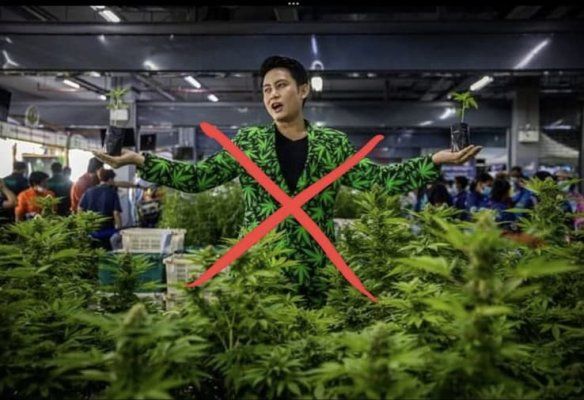Thailand’s Public Health Minister, Cholnan Srikaew, has announced a revised version of the Cannabis & Hemp Control Bill, which is scheduled to be presented at the upcoming cabinet meeting. The proposed bill maintains a firm stance that “cannabis is strictly for medical purposes” and explicitly prohibits any recreational use.
The fate of numerous businesses that have sprung up in the absence of clear regulations since cannabis was removed from the controlled narcotics list in 2022 remains uncertain.
Previously, the Bhumjaithai Party, part of the current coalition government, advocated for cannabis liberalization. However, their bill failed to pass under the previous administration multiple times, with thin support from other coalition or opposition MPs.
Dr. Cholnan outlined that the new bill would specify permitted parts of the cannabis plant, consumption methods, and possession limits.
Under the revised bill, “cannabis stem, roots, leaves, and buds” will be reclassified as “narcotics” due to their THC content. Smoking cannabis may require a doctor’s permit, emphasizing the bill’s focus on “medicinal use only”.
Dr. Cholnan clarified that while different from the Bhumjaithai Party’s proposal, the revision does not oppose cannabis’s medicinal use. It aims to address concerns about cannabis abuse since its delisting from the Narcotic Drug List two years ago.
Recently, during the Coldplay concert held at Rajamangala Stadium, there were numerous complaints about cannabis use. Patrons expressed dissatisfaction due to the waft of marijuana smoke floating around. Popular Thai actor Phanuwat “Copter” Kerdtongtawee highlighted the issue on social media, urging urgent government action to regulate recreational cannabis use.
Dr. Cholnan acknowledged the lack of enforceable regulations against cannabis use at public events like concerts, signaling the need for legal measures.
The upcoming bill is anticipated to mandate permits for all cannabis plantations, with a strong emphasis on medical-grade cultivation practices. Unfortunately, home cultivation, which was initially supported by the Bhumjaithai Party, is unlikely to persist.
Meanwhile, there has been a proliferation of cannabis shops across the country—approximately 7,000 stores. These establishments are currently in limbo, awaiting clarity regarding their operations. The shops offer a variety of cannabis products, including extracts with minimal THC content, primarily intended for medicinal use. Despite lacking a specific “green light,” these retail outlets have taken advantage of the lax enforcement around opening cannabis stores, using it as an opportunity to invest in the budding industry.
The fate of numerous businesses that have sprung up in the absence of clear regulations since cannabis was removed from the controlled narcotics list in 2022 remains uncertain.
Previously, the Bhumjaithai Party, part of the current coalition government, advocated for cannabis liberalization. However, their bill failed to pass under the previous administration multiple times, with thin support from other coalition or opposition MPs.
Dr. Cholnan outlined that the new bill would specify permitted parts of the cannabis plant, consumption methods, and possession limits.
Under the revised bill, “cannabis stem, roots, leaves, and buds” will be reclassified as “narcotics” due to their THC content. Smoking cannabis may require a doctor’s permit, emphasizing the bill’s focus on “medicinal use only”.
Dr. Cholnan clarified that while different from the Bhumjaithai Party’s proposal, the revision does not oppose cannabis’s medicinal use. It aims to address concerns about cannabis abuse since its delisting from the Narcotic Drug List two years ago.
Recently, during the Coldplay concert held at Rajamangala Stadium, there were numerous complaints about cannabis use. Patrons expressed dissatisfaction due to the waft of marijuana smoke floating around. Popular Thai actor Phanuwat “Copter” Kerdtongtawee highlighted the issue on social media, urging urgent government action to regulate recreational cannabis use.
Dr. Cholnan acknowledged the lack of enforceable regulations against cannabis use at public events like concerts, signaling the need for legal measures.
The upcoming bill is anticipated to mandate permits for all cannabis plantations, with a strong emphasis on medical-grade cultivation practices. Unfortunately, home cultivation, which was initially supported by the Bhumjaithai Party, is unlikely to persist.
Meanwhile, there has been a proliferation of cannabis shops across the country—approximately 7,000 stores. These establishments are currently in limbo, awaiting clarity regarding their operations. The shops offer a variety of cannabis products, including extracts with minimal THC content, primarily intended for medicinal use. Despite lacking a specific “green light,” these retail outlets have taken advantage of the lax enforcement around opening cannabis stores, using it as an opportunity to invest in the budding industry.




